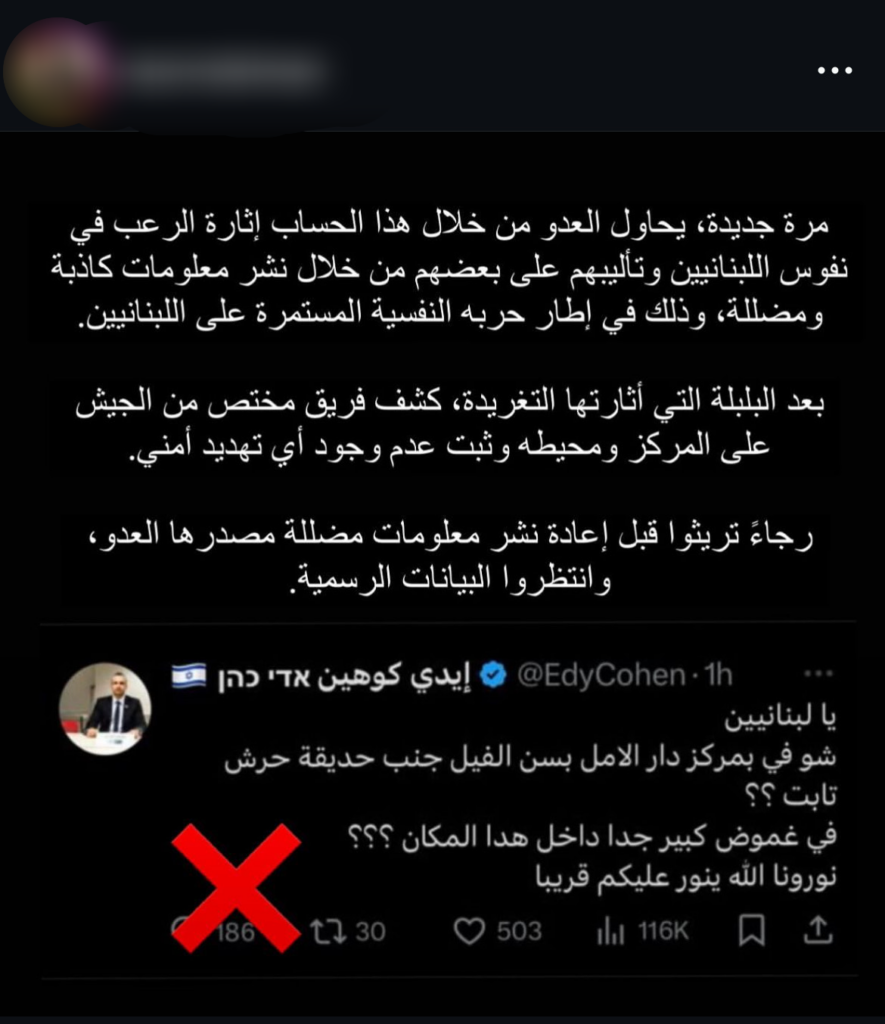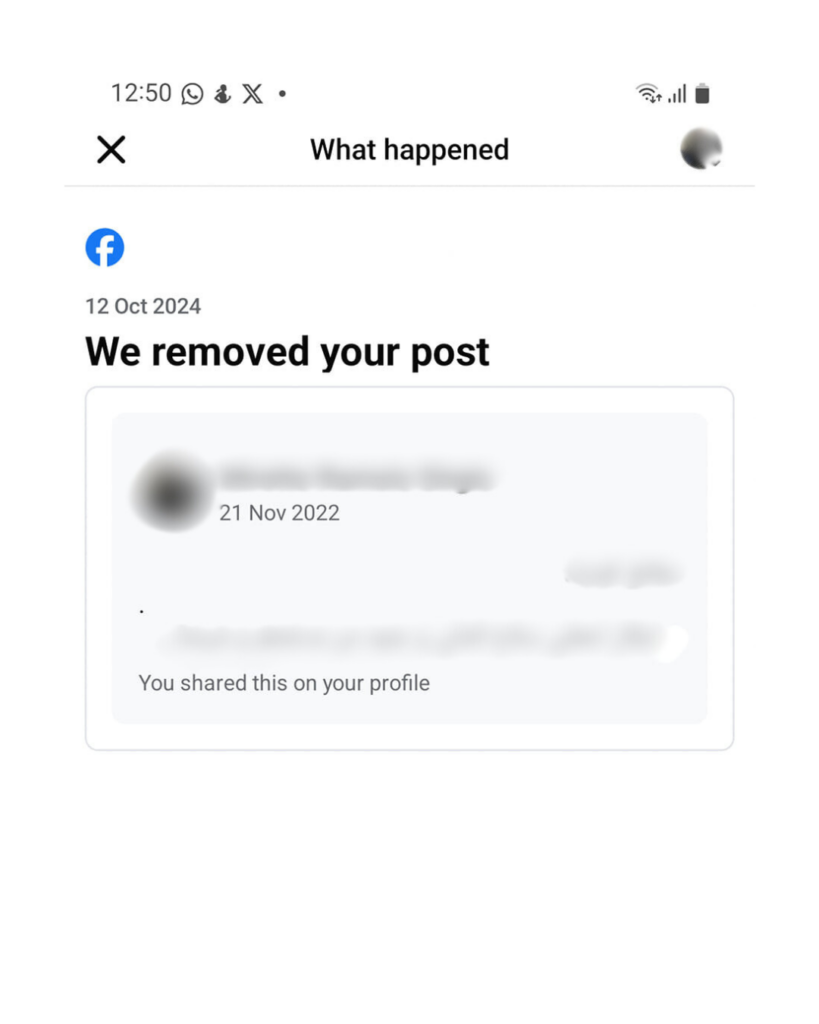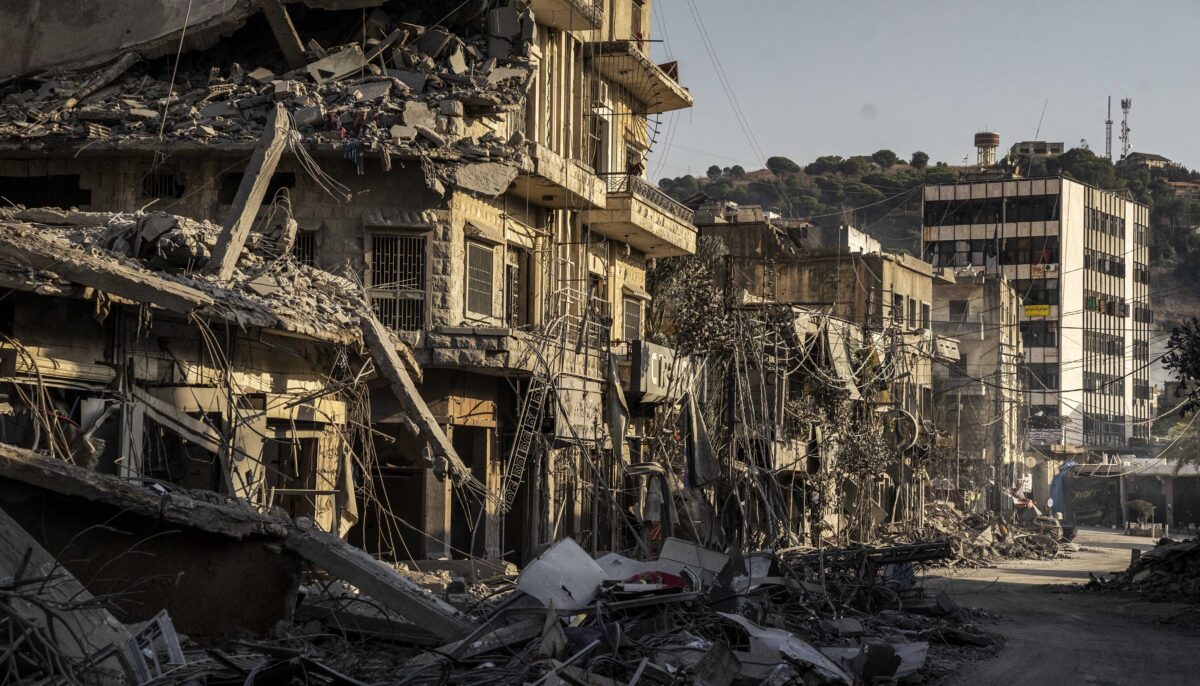Beirut, October 17, 2024 | This week, the Israeli occupation has targeted “safe” areas in Lebanon as another war strategy to incite civil strife. This was coupled with other digital warfare tactics, such as spreading harmful disinformation and ads on social media.
Below, we share the latest updates on digital rights during the Israeli war on Lebanon.
Ogero Telecom Worker Killed in Israeli Airstrike
On October 15, a Lebanese Ogero maintenance worker was killed with his family of four in an Israeli airstrike that targeted his house in the Southern town of Jarjouh, in the Nabatieh District. Despite the ongoing Israeli aggression, Mohammad Mchawreb refused to leave, adamant on fixing the area’s network towers which were getting damaged by the constant bombardment.
The Israeli occupation has targeted a large number of cell tower stations in the South, the Bekaa, and parts of Beirut, striking telecom antennas and disconnecting large areas from the internet for days. SMEX condemns Israel’s targeting of telecommunication infrastructure and calls on the Lebanese government to ensure war-affected areas have proper connectivity.
Israeli Disinformation Campaigns
On October 15, Edy Cohen, an Israeli “journalist,” published a statement on X accusing a center hosting Internally Displaced People (IDPs) of being ambiguous and concealed, inciting fear among residents in the area who fear they will be Israel’s next target.
Following the statement, a team from the Lebanese Internal Security Forces searched the place and announced that it did not find any “prohibited” items, debunking Cohen’s claim.

Tweet: Dear Lebanese, what is there inside the Dar El Amal center in Sinn El Fil next to Horsh Tabet Park? There is a lot of ambiguity inside this place?? Enlighten us, may God enlighten you soon.
The Israeli occupation has been targeting residential buildings in supposedly “safe” areas the past week, such as Aitou, Saida, and a neighborhood in central Beirut, raising suspicion and fear among residents.
SMEX has compiled a list of recommendations for residents to stay informed during a communication crisis. Read it here!
Ads on Social Media
As previously documented, many people in Lebanon have encountered sponsored ads across various social media platforms, especially on Facebook and X, asking them to join the Mossad (the main Israeli Intelligence Agency) or other Israeli-sponsored websites such as the Munked platform, which claim to offer a way to “save” themselves during Israel’s barbaric aggression in Lebanon.
A new ad has recently emerged with an anonymous user not directly tied to Israeli intelligence, asking them to get in contact with them to “save themselves” if they are tied or related to Hezbollah.
Text: Collaborating or related with Hezbollah? The situation and the future are unsafe and uncertain. Do you want to save your skin? Contact us and don’t hesitate.
Text: Hello dear friend, you are now in the right place. The Lebanese people are going through hard times at this stage. Leave it to us and we will take care of their futures and their families’ future. We assure you that contacting us is safe for you, and we assure you that we will take care of you even during tough times. Visit this form for more information.
As always, SMEX warns against visiting websites from unknown sources, scanning random QR codes, or entering any group chat sent by strangers, regardless of their purpose.
WhatsApp Bots
Malicious actors intensify cyber attacks during conflict and war, compromising your digital security. WhatsApp is prone to bots and phishing attacks—beware of replying or engaging with any bots.
We recommend you verify the source of any forwarded messages, as misinformation spreads rapidly. Enabling two-factor authentication and regularly updating your privacy settings can add extra layers of protection too!
Check out our tips to protect yourself online.
Censorship and Content Moderation on Meta
Since the onset of Israel’s genocidal war on Gaza, censorship and content moderation on social media platforms, specifically Meta (WhatsApp, Facebook, and Instagram) have been on a constant rise.
Our Digital Safety Helpdesk’s latest cases indicate that wrongful content moderation of social media posts related to the wars in Lebanon and Palestine is still ongoing. Users from Egypt and Lebanon even reported that Facebook removed content that dates back to 2020.

Users posting about the war in Lebanon are reporting that their activity on Instagram, such as posting and messaging, are being restricted until the app initiates an update, according to our Helpdesk.
Even for accounts that appear “clean” on Instagram’s “Account Status” section—which shows if there are restrictions to an account’s activity—users have reported they are still unable to collaborate or go live in some cases.


Learning from their experiences with speaking up about Palestine online, people have adopted their methods to cheat the algorithm by using creative language. Users have reported avoiding words that trigger moderation, or phrases that are flagged by Meta’s algorithms like political groups designated as “terrorist” by the Dangerous Organizations and Individuals (DOI) list, or terms that are considered a call for violence. For example, they substituted explicit mentions of figures or topics like “Israel,” “Hamas,” “Zionism,” and “terrorism,” and instead used alternative spellings, creative symbols, or a mix of languages (e.g., half Arabic, half English).
Others found that replacing parts of sensitive words with emojis or other symbols were successful in evading detection. For instance, using “Palest!ne” instead of “Palestine.”
While SMEX does not encourage self-censorship on these platforms, these tactics have been somewhat useful amid the harsh moderation crackdown on speech supporting Palestinians and exposing Israeli crimes. Social media companies are responsible for protecting political speech on their platforms without blatantly muzzling freedom of expression, especially during a genocide.
People have reported that Meta’s algorithms tend to focus more on permanent posts than temporary ones, stating that sharing sensitive content via stories reduced post takedown.
Be mindful of comments: Meta’s algorithms monitor comments, and frequent reports or the use of certain language can lead to account restrictions.
“Devices” in Aid Packages?
A number of internally displaced people reported finding “electronic devices” in aid packages, causing a state of confusion and suspicion amid already trying conditions. However, the Lebanese State Security issued a statement, clarifying that these found devices are only meant to prevent the products from spoilage.
Panic has become a common reaction to non-threatening incidents following Israel’s digital terror campaigns that have injured thousands and killed civilians over the past month.
SMEX’s Digital Safety Helpdesk urges vigilance against digital threats, especially during this war, when disinformation and malicious tactics are on the rise.
If you still suspect any form of digital threat, contact our Digital Safety Helpdesk:
Signal/WhatsApp: + 961 81 633 133
Email: helpdesk@smex.org
Cover Photo: JOSE COLONANADOLUAnadolu via AFP



